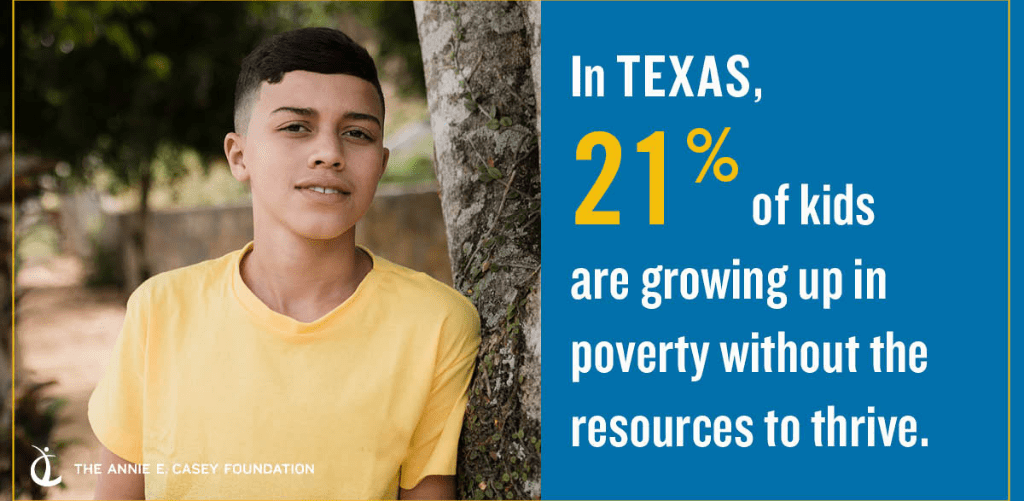Texas continues to be one of the 10 worst states for kids based on the 2019 KIDS COUNT Data Book released today by the Annie E. Casey Foundation. The report shows Texas ranking 41st out of the 50 states in overall child well-being, marking a greater urgency for policy and lawmakers to invest in our children’s needs. This is especially key with the upcoming 2020 Census, which could worsen our children’s conditions if children are under counted and their needs are not prioritized.
For 30 years, the Annie E. Casey Foundation has been assessing children’s overall well-being on both national and state levels in four domains: health, education, economic well-being, and family and community. According to this year’s report, Texas ranked below the national average in all four areas. Texas placed 39th in health; despite showing a slight improvement from placing 41st in last year’s report, there is still a strong concern on Texan children losing health coverage under Medicaid and CHIP insurance. In regards to education, Texas placed 30th, two places up from last year’s performance. Texas placed 39th for economic well-being, which is four spots below last year’s rank and further reiterates the ongoing poverty children face and the lack of state aid towards children’s food security and families’ financial stability. Finally, Texas remained in 47th place in terms of family and community, stressing the continuous alarming teen birth rate in the state. These small progresses reflected in the report only go to show that there is still more work to be done.
The recently completed 2019 Texas Legislative Session was an opportunity to enforce policies and programs that could improve our kids’ well-being. Unfortunately, there was much disappointment on the health care front. State legislators failed to pass legislation to improve health insurance coverage particularly for kids, women of childbearing age, and adults. On the education front, lawmakers introduced a new school finance bill that provided districts comprised of greater concentrations of low-income students with more funding per low-income student. However, there are other funding and equity challenges faced by low-income students and English language learners that the bill does not address. Moreover, in the absence of state action to provide access for paid sick leave to 4.3 million Texas workers, locally-elected officials from Austin, San Antonio, and Dallas have passed city ordinances requiring paid sick days. Finally, state legislators did not pass any legislation to alleviate teen birth-rates, as Texas is the only state in the nation that does not currently include birth control as a benefit under CHIP.
These pressing issues build on the gravity of the impending 2020 Census’ role in improving child well-being. The 2020 Census will be allocating billions of dollars for health care, housing, and food programs that Texas kids and families count on. Therefore, it is crucial to have an accurate Census count in order to attain a sufficient amount of federal funds for public services, cash assistance, child care subsidies, and Supplemental Nutrition Assistance Program (SNAP) benefits. Unfortunately, Texas kids under the age of five have historically been excluded in the Census count, and 30% of them are at an increased risk of being missed in the 2020 Census. Moreover, any conversation on child well-being in Texas must include the thousands of children who are currently being held in “baby jails” by the federal government, which further speaks to the messy state of our nation’s immigration policies. Despite all this, state lawmakers still neglected to allocate state funds for an accurate count of Texas residents. If our young children continue to be undercounted in the Census, then their current well-being will likely worsen.
With the second largest child population in the nation, Texas still has an opportunity to improve children’s welfare and pave the way for other states. Instead of being discouraged by the data brought by the Kids Count report, we should advocate for more effective policies that address issues on children’s health, education, economic well-being, and family and community, and take local action to count all kids in the upcoming 2020 Census.
We love all our Texas children, so let us show greater support for them and call on our leaders to do the same.
CPPP Communications Intern Rani Davina Chan contributed to this blog post.

